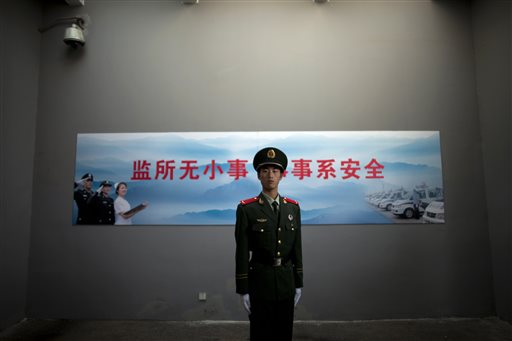China says country making ‘enormous efforts’ against torture

In this Oct. 25, 2012 file photo, a Chinese paramilitary policeman stands guard underneath a surveillance camera at an entrance to the Number Two Detention Center in Beijing, China. China’s deep-rooted practice of using torture to extract confessions from suspects has seen little improvement despite measures introduced since 2010 to reform the criminal justice system, an international human rights group said Thursday, Nov. 12, 2015. The slogan on the wall reads “No small matter in detention center, everything concerns safety.” AP FILE PHOTO
GENEVA, Switzerland—Chinese officials told a UN hearing Wednesday their country was working hard to root out torture, but experts and activists accused them of dodging tough questions and insisted the practice remained commonplace.
Speaking before the UN Committee Against Torture, a large Chinese delegation insisted their country had made “tangible, visible and sustained” achievements in stamping out the scourge of torture from the country’s legislation, judiciary and law-enforcement.
Wu Hailong, China’s ambassador to the UN in Geneva and head of the delegation, said his country’s “position against torture is firm,” insisting it was making “enormous efforts” to halt the abuse.
He and other delegation members spent several hours answering a barrage of questions from the 10-member committee on the first day of the hearing in Geneva on Tuesday.
The committee, which periodically reviews the records of all 156 countries that have ratified the Convention Against Torture, raised a broad range of concerns, including allegations that torture is rife in police detention with little or no accountability for the perpetrators.
Li Wensheng, the deputy director general of legal affairs at China’s public security ministry, insisted the country “prohibits torture and prosecutes any personnel or state organs for torture activities.”
“There are plenty of cases prosecuting torture offenders,” he told the committee, pointing for instance to a case of five police officers sentenced to up to two years in prison for extracting confessions under torture.
Committee member Alessio Bruni responded dryly that those penalties seemed “rather mild.”
A report by Amnesty International last week detailed how suspects received electric shocks, were punched, kicked, hit with shoes or bottles filled with water, denied sleep and locked in iron chairs forcing them into painful postures for hours on end.
Interrogation chairs ‘increase safety’
Responding to queries about the use of the so-called “interrogation chairs,” Li Zhongcheng of the Chinese prosecution authority insisted they were needed to hinder detainees from escaping, injuring themselves or their interrogators.
“To avoid such situations we use interrogation chairs. The chair is sometimes packaged with soft padding to increase a sense of comfort and to increase safety,” he said.
Jens Modvig, one of the committee’s top investigators, remained unconvinced, pointing out that “in a detention place there (should be) no need for restraints.”
Patrick Poon, one of the researchers behind the Amnesty report, told AFP after the hearing that the chairs were among the biggest complaints from lawyers and their clients.
“They are restrained for hours, and that is very painful. It is really a form of torture,” he insisted, adding that the delegation’s comments “show the government is not very sincere.”
Officials from Hong Kong were meanwhile taken to task over the police crackdown on last year’s pro-democracy protests.
Hong Kong’s permanent secretary for security Law Chi-kong Joshua insisted to the committee that the police force had shown “a high degree of restraint,” pointing out that 133 officers had been injured during the 79-day protest.
Hong Kong activist Ken Tsang, who was filmed during the protests being punched and kicked by a group of police officers while in handcuffs, did not agree.
“They are just lying They are trying to minimise the violence towards the demonstrators,” he told AFP after the hearing.
Seven police officers were charged with assault over the incident, while Tsang himself was also charged with attacking 11 police officers.
Tsang, 40, said he had traveled to Geneva to “help put some international pressure on the government” and to protest that the police officers were not charged with torture.
The video, aired by local television network TVB, showed a group of men hauling a handcuffed Tsang to a dark corner in a public park. One man stood over Tsang punching him while three others repeatedly kicked him.
“If it’s not torture, what is?” Tsang asked.
RELATED STORIES
Rights group: China use of torture uncurbed by legal reform
Amnesty blasts China’s torture tool industry














